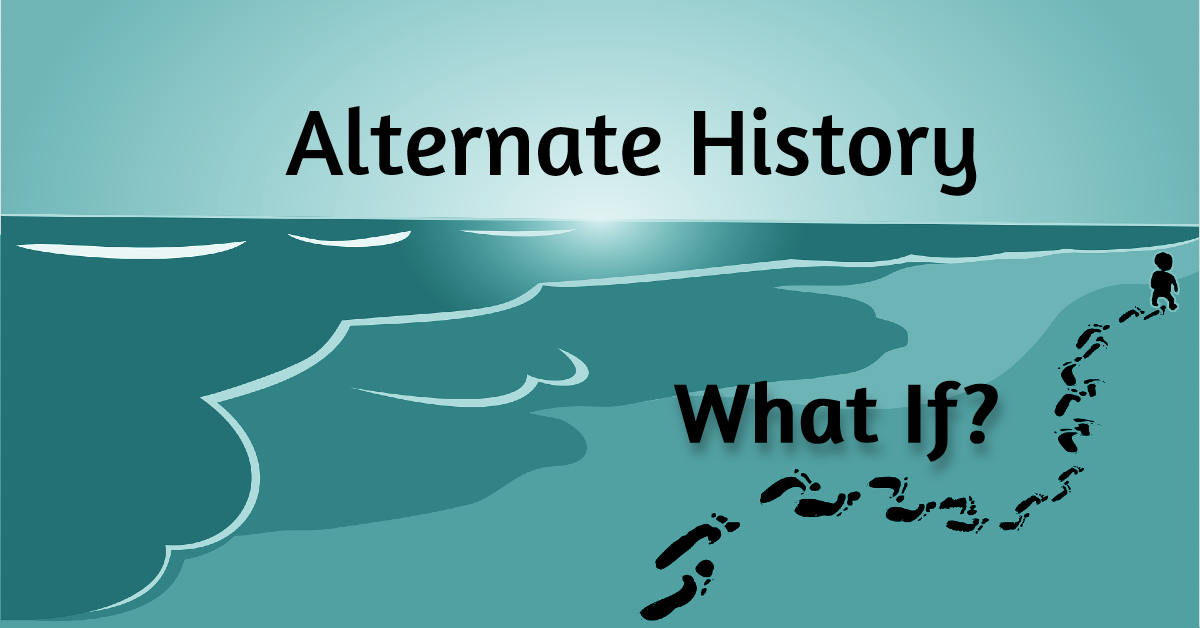
What if?
What if the Neanderthals had become the dominant species of Hominids? If Napoleon had conquered America? If there had been no Industrial Revolution? If space aliens had come to Earth to fight for African-American civil rights?
Welcome to the world of Alternate History. When I first had the idea of writing fiction based on real people but under different circumstances, I had no idea how huge this field was and the many things I had to take into account to do it right. I’m still in learning mode.
Time travel fiction seeks to change the past. Science fiction seeks to change the future. Alternate history at its most optimistic seeks to find when we went wrong and to change that moment.
Inspiration
I was simply interested in writing about Harvey Milk and Alan Turing, and as a Jew, I wanted a universe where there was no Third Reich and no Holocaust. And to make things better for my characters and better for the world at large.
What would happen if there was no World War II? There’s the big effects. The world’s population would be larger. The Soviet Union might not come into being, nor would there be a divided Germany, a divided Korea, a war in Vietnam, and perhaps not so much of a Communist Scare. Maybe no Sputnik? No Man on the Moon, if NASA Nazi Wehrner von Braun never made it to the US. And nearly every country would be affected.
Without the War, the US would need another way to get out of the Great Depression. FDR would only be President for two terms and we’d probably not have Truman or Eisenhower as Presidents. Nor Nixon.
There would also be social and cultural effects. Pizza became popular in the US when soldiers based in Italy came from WWII. The fruit crumble, loved in the UK, was the child of WWII food rationing. Geddy Lee, the lead singer of Rush, was the son of two Holocaust survivors, who probably would not have otherwise met. And Anni-Frid Lyngstad of ABBA was born as a product of a Third Reich Eugenics program. On the plus side, Glenn Miller might have lived longer. But we’d have no game of Clue. It was invented to pass time during the Blitz.
Ramifications
Come to think of it, I might not even exist. My parents met in Israel. Both of them had come there for a post-doc following the Six-Day-War. But in my alternate history, I envisioned a new country, Palestisrael, where Jews and Palestinians lived side by side in harmony. There would be no need for Israel to attack Egypt preemptively in 1967. Thus, no me.
As I delved more into Alternate History, I found it to be a vast and complex field. On one side, there are professional historians who write what is called a counterfactual, where they take a possibility and follow it through, playing it straight based on historical data. For example, what if Lincoln were not assassinated?
Then there are those who write stuff like Jesus being saved by space aliens or that Jews used an army of Golems to win the Warsaw Ghetto Uprising. There is a technical term in these circles, ASB, or Alien Space Bats, referring to writers who introduce the more fantastical elements. I am somewhere in between the extremes.
Other terms in the Alternate History jargon include POD, which refers to Point of Divergence, as in where does your timeline veer off from the timeline of our world? In my dream of preventing World War II, without giving spoilers, the POD would have to take place before the Third Reich came into power.
Alternate history writers often speak of butterflies evoking chaos theory, and that minute changes in one aspect of the world can lead to profound differences.
History of Alternatives

Many people love to play the Alternate History Game. Perhaps the most famous author is Harry Turtledove. I recently read his Joe Steele, which imagines that a certain Georgian immigrant became a US dictator. Stephen King’s sprawling, 11/22/63 involves a magic portal that enables the protagonist to prevent the assassination of John F. Kennedy? But is that truly the best outcome? Read and find out.
Robert Silverberg has also done interesting work, including Roma Eterna, in which the Roman Empire never dissolves. And there’s Michael Chabon’s 2007 The Yiddish Policeman’s Union, which won a Hugo, a Nebula and the Sidewise Award for Alternate History. My friend Martin Gidron also won a Sidewise for his novel The Severed Wing, where there is also no Holocaust.
It’s no accident that many Alternate Historians are Jewish, like me. We, like other persecuted minorities, would love it if things had been different. Even though one of the most popular alternate history ideas imagines the Nazis won, we need more stories where they never came into power.
Which Universe?
Call me hopeful. The theory of multiple universes need not lead to the nihilism expressed by the daughter of Michelle Yeoh’s character in Everything, Everywhere All at Once, but give us a chance to cast a spell for a better world. That somewhere, my grandparents’ first cousins did not get murdered, along with so many others.
If you’d like to dip your toe into Alternate History, start with the history of the genre, which goes back to Roman times. The first such story in English may be Nathaniel Hawthorne’s “P.’s Correspondence.” From there you can read this list, arranged in chronological order and this list on Goodreads.
When you’re ready to geek out, visit uchornia.com, which lists hundreds of books and short stories from all over the world, arranged by the POD. Then come over to alternatehistory.com and enjoy discussions such as “Pedro, Brother of King Alfonso V of Aragon, marries an Ethiopian Princess.”
There are many fun anthologies, such as Alternate Presidents edited by Mike Resnick and The Holocaust Averted: An Alternate History of American Jewry, 1938-1967, edited by Jeffrey S. Gurock. Wikipedia is also a good friend for this, listing all proposed fictional US presidents. I found the latter helpful in figuring out the alternate presidents in my writing.
History Gone Wrong
Examples of history gone wrong are all around us. Global warming, wars, pandemic deaths, ethnic, religious, and racist hatred, authoritarian governments, increasing attacks on trans people and the LGBTQIA community worldwide, the 2023 massive train wreck in India, and more.
Thus, writing an alternate history is more than an intellectual exercise. It can be an act of defiance and resistance conveying the message that even in these challenging times, our positive choices, however seemingly small, can make a difference in ways we cannot fathom.
What would you like to change in history? The possibilities are endless.
Your change can be as big as a battle or as small as who played at Eurovision. (True fact: the Portuguese Eurovision entry in 1974 sparked a political revolution.) Have fun exploring the repercussions whether they be political, economic, social, or cultural. Consider not only the effects on famous people but upon ordinary individuals.
Run With It
With a combination of thorough research and far-flung imagination, you can create a work that draws in both fans of speculative fiction and general readers struggling to make sense of the world and hoping for a better alternative. Remind your readers that they are never bereft of agency and that if they can prevent an undesired outcome in one respect, they might be able to do so in another.
Whether you win an award or simply experience the satisfaction of creating a tale well-told, if this article prompted you to write an alternate history, go ahead and thank me for the butterflies.
Naomi S. S. Jacobs (she/they) is an artist, poet, activist, Jewish historian, and writer of speculative fiction, including alternate history about power couple Alan Turing and Harvey Milk.

